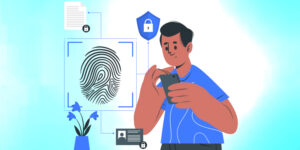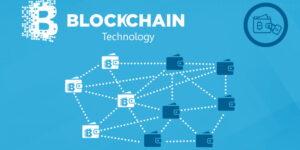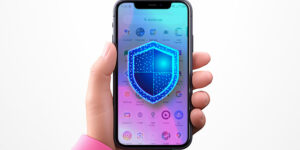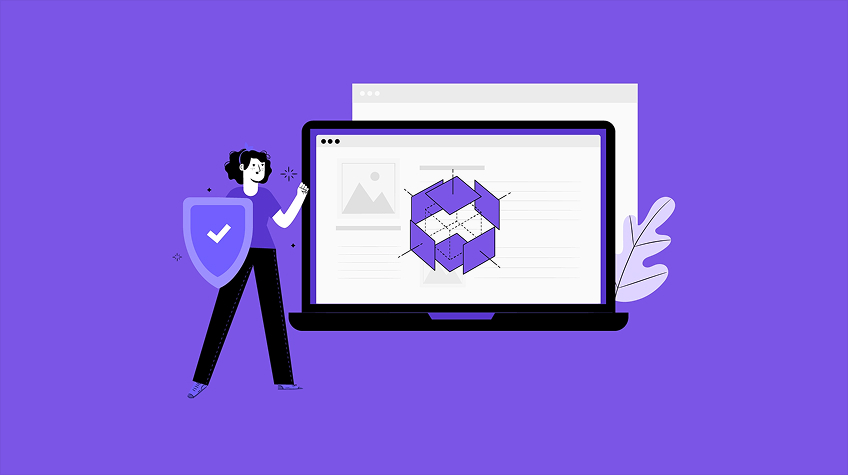
Mobile app security has gained more importance than ever. As the risk of data breaches and identity theft is increasing, mobile app development companies are resorting to blockchain to create more secure and reliable apps. Here’s how blockchain enhances app security.
Mobile applications have significantly impacted our daily activities, whether it is in the realm of banking, shopping, healthcare, or social networking; we use apps almost everywhere. However, data breaches, hacks, and privacy problems have also been on the increase, with the increased mobile usage. Being a mobile application development company, we are constantly challenged with one question that our clients repeatedly ask us: How safe will our app be?
We have discovered an effective answer to this in the form of blockchain technology. Developed as a method of security in cryptocurrency, blockchain is becoming a game-changer in regards to keeping applications secure. In this blog, we will discuss the best reasons why blockchain should be used in mobile app security and how every app development company needs to integrate it into their products.
What Is Blockchain Technology?
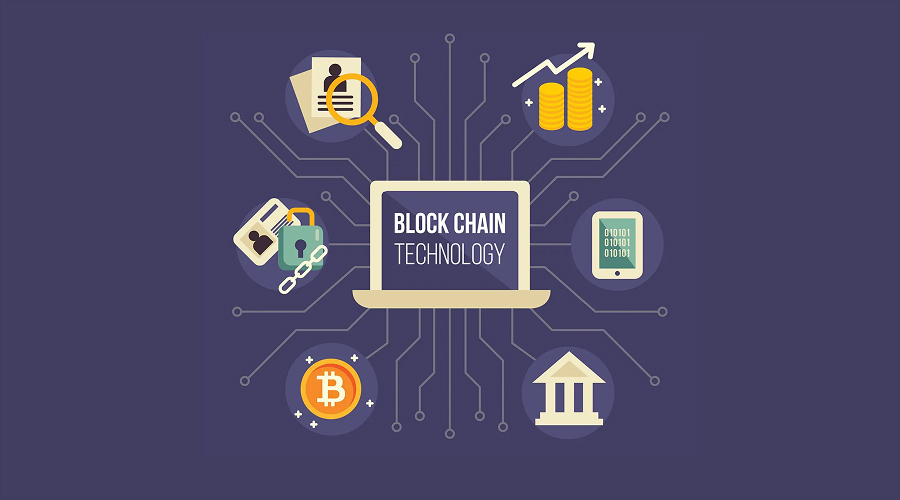
Blockchain may be called a decentralized online ledger that records transactions on a large number of computers. Each record (known as a block) is linked to the next record, and it becomes a chain. Once data is added to the blockchain, it cannot be altered without altering every subsequent block. This makes it very safe and clear. Let’s now take a closer look at how blockchain technology enhances the security of mobile apps.
Top Benefits of Using Blockchain in Mobile App Security
1. Decentralization Reduces Vulnerability
The traditional mobile app architectures deal with the concept of data being stored in centralized servers, which makes them prone to cyberattacks. When such a server is breached, the whole app and user data may be damaged. Being a mobile app development company, we have found blockchain as an excellent alternative. Blockchain is decentralized, which means that data is stored on several network nodes. Such a structure eliminates any single point of failure, and it is extremely difficult to corrupt or manipulate the system by hackers.
In case of an attack on one node, the rest of the system is not affected, thus ensuring continuity of operations. Not only does this decentralized architecture make security much more robust, but it also ensures a greater degree of reliability of mobile apps, particularly in those apps that process sensitive financial or personal user data.
2. Transparency Builds Trust and Accountability
Modern mobile applications, particularly financial or health-related apps, require transparency. Blockchain provides a committed, recorded, and definite journal of everything done within an app. All transactions are registered, time-stamped, and stored permanently, making them fully traceable. As a software development company, we incorporate blockchain to assist businesses in gaining the confidence of users and holding an organization accountable in every transaction.
Blockchain streamlines the process when clients request the feature associated with clear records, transaction logs, regulatory auditing, or internal processes. It removes the necessity of manual record-keeping and eliminates the possibility of fraud or manipulation risk.
3. Advanced Encryption for Maximum Data Protection
A top priority in any mobile app that we develop is security. The blockchain technology goes an extra mile to ensure data protection through sophisticated cryptographic methods. Any individual data is encrypted and chained to a prior one through the use of a unique cryptographic hash, producing a tamper-resistant chain. This means that any illegal attempt to tamper with the data would break the chain and notify the system at once.
Blockchain offers a secure backdrop to such apps that deal with sensitive information of users, such as bank details, medical records, and confidential information. Being an app development company, we apply blockchain so that even the person who intercepts the data would not be able to read or misuse the same.
4. Decentralized Identity for Safer Authentication
Mobile app user authentication is the biggest weak point in app security. The majority of applications continue to use passwords, which aren’t difficult to hack or forget. Blockchain comes with a superior model of decentralised identity management. The option is provided to the user to use a digital signature or cryptographic keys to log in, which is in turn stored on the device, not on centralized servers.
This significantly limits the chance of phishing, stealing credentials, or hacking databases. Based on our experience with development, we find that blockchain-based login systems enhance security and user experience. This model is very advantageous to clients who require environments where they have a high level of trust, such as legal apps, digital wallets, or remote medical services.
5. Smart Contracts Ensure Secure and Automated Transactions
Smart contracts are computerized digital agreements held in the blockchain. They do things when certain preset conditions are fulfilled, but they do not require intermediaries. In mobile applications, it equates to high-speed transactions, assured security, and reduced mistakes. In mobile development, we make use of smart contracts to manage subscriptions, user privileges, or automatically pay something.
These contracts can not be changed after implementation, making them tamper-proof and transparent. It can be any type of finance app that processes peer-to-peer payments or a logistics platform that manages the release of shipments. Smart contracts help simplify complex processes.
6. Distributed Network Improves App Reliability
Issues related to downtime, such as server failure, customer maintenance, or malicious attacks, turn out to be a huge problem for any mobile application. Blockchain enables mobile-based applications to operate on a decentralized network with several nodes underpinning it at the same time. This removes the risk of complete failure if a node fails.
As a mobile application development company, we had a chance to experience the reliability and availability advantages of such an arrangement, in particular, when it comes to mission-critical applications, e.g., emergency services, express sharing, or money-related applications. Blockchain assists the app to pass the stress test, and this assures users of the app’s availability at all times.
7. Immutable Records Prevent Unauthorized Changes
The integrity of data is essential in applications that involve storing sensitive information or those that possess historical data, like transaction history, court records, and health reports. Blockchain cannot be altered or destroyed at any single point unless there starts a consensus in a network-wide sense. This leaves tampering nearly out of the question. This advantage is priceless to our clients in industries with stiff regulations on data accuracy and audit trails.
Each record is provided with a cryptographic hash securing it to other previous blocks. In case one tries to change just one value, the whole chain is broken down, and the violation is reported.
8. Hash-Based Protection Blocks Data Tampering
Blockchain involves hashing to guard against tampering with data. Any block has a unique hash value, which is similar to a digital fingerprint. Any manipulation of data also provokes a change in its hash, effectively revealing tampered data immediately. We incorporate this hash-based check into an application where data integrity is essential.
For example, apps used for financial tracking, legal documentation, or supply chain records, hashes act as silent guardians of truth. As a mobile app development company, this will give us some level of assurance that mobile app data will be consistent, authentic, and verifiable.
Real-World Use Cases
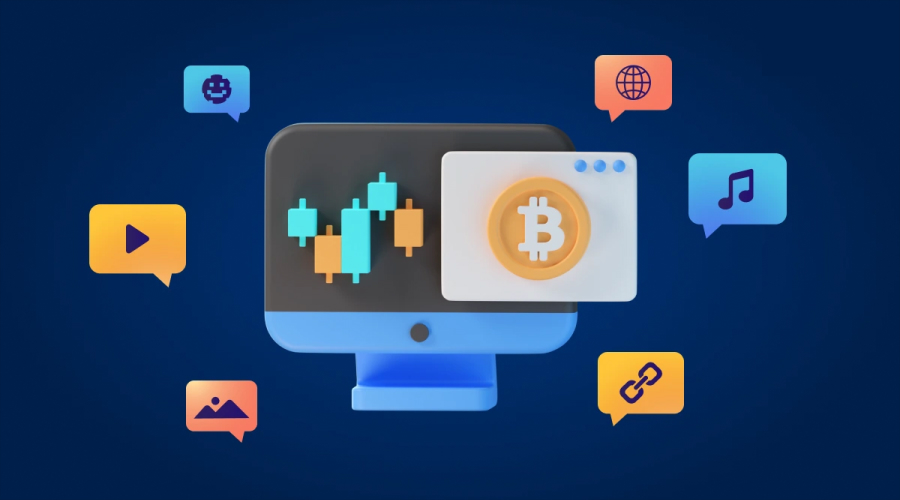
These are a few examples of mobile apps based on blockchain:
- Brave Browser: An encrypted third-party mobile web browser that rewards points to users using a blockchain-based reward system.
- Everest: An identity application that is based on blockchain and enables the user to authenticate their identities.
- MedRec: An online blockchain-based medical record application that enables data to be shared safely and securely with patients.
- VeChain: A blockchain-based supply-chain monitoring app.
These practical cases show that blockchain is already making mobile apps more secure in various industries.
Conclusion
The development of safe, sound, and easy-to-use apps is our primary objective as a mobile app development company. In the modern age of digitalization, when security threats are a frequent occurrence, blockchain is a powerful and future-proof solution. It has a decentralized structure, high levels of encryption, immutable records, and smart contracts, which would significantly contribute to the protection of mobile apps.
No matter what kind of app you are developing (a finance app, a health tracker, or an e-commerce platform), including blockchain can provide your app with a strong advantage in terms of security. In case you are thinking about creating a mobile application and worry about data security, then blockchain is a solution. And we are here to assist you in doing it in the right way.


